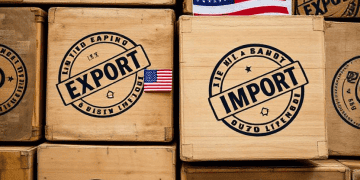A segment of consumers in Canada and parts of Europe is moving away from purchasing U.S.-made goods, citing trade policies and diplomatic strains as key reasons.
In Canada, shoppers have increasingly turned to domestically produced alternatives, with some grocery stores labeling local products with Canadian flag stickers to encourage local spending. Among them is Todd Brayman, a Royal Canadian Navy veteran from Nova Scotia, who has replaced U.S. products in his household with Canadian-made goods.
“I’ve served alongside American forces, and it’s disappointing to see the current state of our bilateral relationship,” Mr. Brayman said. He now uses a mobile app to identify the origin of products and opt for local alternatives. One such app, Maple Scan, has recorded over 100,000 downloads since its launch. Several similar tools have emerged, including Buy Canadian, Is This Canadian?, and Shop Canadian, reflecting growing interest in supporting local businesses.
The shift comes amid a series of U.S. tariffs introduced under former President Donald Trump’s administration, including a 25% duty on imported steel, aluminum, and vehicles, along with other measures affecting goods from Canada, Mexico, the EU, and the UK. The U.S. government argued the tariffs would benefit domestic manufacturing and reduce the trade deficit, though global markets saw volatility in response.
In retaliation, Canada implemented countermeasures amounting to C$60 billion, along with additional tariffs targeting sectors such as the U.S. auto industry. These policy changes have contributed to a decline in cross-border travel from Canada to the United States, and a wider reassessment of trade and consumption habits.
Similar sentiments have appeared in Europe, particularly in Denmark. Reactions there were partly driven by remarks from President Trump suggesting an interest in purchasing Greenland, a Danish territory—an idea Denmark firmly rejected.
In Denmark, the Salling Group, the country’s largest grocery chain, has introduced black star symbols to identify European brands on store shelves. Some Danish consumers have taken further steps. Bo Albertus, a school principal in Skovlunde, cancelled his U.S.-based streaming service subscriptions and now manages a Facebook group with 90,000 members that promotes non-U.S. goods.
In Copenhagen, shop owner Mette Heerulff Christiansen has removed U.S. products such as Cheetos and Hershey’s chocolate from her store and replaced them with European alternatives. “Coca-Cola was easy to swap for a local brand,” she said, though she acknowledged that avoiding U.S. tech services remains difficult.
While the movement has gained attention, some economists question its long-term economic impact. Douglas Irwin, a trade policy expert at Dartmouth College, noted that past consumer boycotts have typically had limited and short-lived effects on trade flows. “They tend to begin as reactions to political developments but often fade over time,” he said.
Nonetheless, some Canadian businesses have seen a boost. Grocery chain Loblaw reported double-digit growth in Canadian product sales, and the “Made In Alberta” initiative has seen a rise in traffic and engagement, according to Bianca Parsons of the Alberta Food Processors Association.
Meanwhile, some U.S. companies have experienced repercussions. Vermont-based Caledonia Spirits, for example, had a shipment to Quebec canceled following the announcement of Canadian counter-tariffs. “I think things escalated quickly,” said Ryan Christiansen, the company’s president. “I’d prefer a more cooperative approach to resolving trade issues.”
Other business owners, such as Ethan Frisch of New York-based spice company Burlap & Barrel, expressed concern not only about boycotts but also about inflation and broader trade disruptions. “The assumption that boycotts will drive economic change may be overstated,” Frisch said. “Many businesses are already facing significant challenges regardless.”
As trade dynamics continue to evolve, the consumer response highlights growing interest in local sourcing and the broader implications of international economic policy decisions.
Discover supply chain logistics news updates on The Supply Chain Report. Free international trade tools are available at ADAMftd.com.
#TradeTensions #ConsumerBehavior #USExports #CanadaEuropeTrade #GlobalTradeShifts #CrossBorderCommerce #InternationalMarkets















